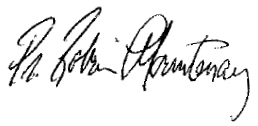Sermon
The B-i-b-l-e
When I started attending Sunday School at the tender age of 3, I learned a song whose title lends itself well to this article. It went: “The B-i-b-l-e, yes that’s the book for me. I stand alone on the Word of God, the B-i-b-l-e.” Perhaps you learned it too. When I Googled this song to make sure I had the words right, I found that there are two other verses: “The B-l-o-o-d that Jesus shed for me …” and “S-a-v-e-d by g-r-a-c-e …” I’m not sure whether or not we sang those too. As good as they are, it’s the first verse that concerns me at the moment.
Daily Bible reading has been a part of my life for many years, though not all my life, or even throughout my ministry. Several years after ordination I realized that spiritual discipline was lacking from my life (and, to be honest, it still is) and I found in my library a copy of Concordia’s Daily Office, which I had purchased some years before in the seminary book store. I began saying (to myself) Evening Prayer before I went to bed each night (and after we had said bedtime prayers with the kids). After several years I had nearly worn out my copy of the Daily Office, and, by the grace of God, I was introduced to The Moravian Daily Text* by the late, great Luther Scholar, Eric Gritsch. This wonderful little book, which I’ve mentioned before, takes the reader through the Bible in two years and all 150 Psalms in one year, by assigning one OT, one NT, and one reading from the Psalms each day of the year (except Sundays, when the reader is directed to the lectionary readings).
The discipline of daily Bible readings has been a real blessing to me. It’s not just that I can say that I’ve read the Bible cover to cover at least 12 times (which I have), but it’s that by daily immersion the Bible has become an integral part of my life. I must admit that I don’t find every page of scripture equally compelling, nor do I find answers to every one of life’s questions in its pages. Some of the readings seem overly long and ponderous. Others tell stories that are horrific to 21st century sensibilities. Yet, God speaks through scripture, sometimes in spite of the minutia or the so-called texts of terror. Despite its antiquity, the Bible continues to reveal God’s Word and to describe the fragile relationship between Creator and creature.
The miracle of scripture is that it addresses us where we live. Though I’m not always as attentive to my daily readings as I should be (that is, there are days when I rush through one or more of them because of the needs of the day or the tedium of the text – think Leviticus!), I find that the Word continues to come through loud and clear. Despite my relative familiarity with most of the Bible, I’m always gaining new insights as I read it anew. Just as our situation in life changes, so does the message we receive when we attend to God’s Word.
Christians, Jews, and Muslims are often called “the People of the Book.” Scripture is something that all Christian denominations hold in common, and it also represents a common bond with our Jewish neighbors (the OT), and, to some extent, Muslims (while the Quran is their most sacred text, they also recognize the efficacy of both the OT and NT). The Bible is also the book of the people. Even as we read scripture silently in solitude, we are reading it with God’s people of all times and in all places. Knowledge of the Bible also opens our hearts and minds to the proclamation of the Gospel in worship each weekend. The Bible interprets itself in a very real sense – when we hear Christian preaching, we bring to it our own familiarity with and understanding of scripture. The Holy Spirit unites our private reading with public proclamation to present God’s Word to us. These two aspects of experiencing scripture are complementary and both are essential to our life of faith.
Luther said that the Bible is the cradle in which we received the Christ child. That is, our exposure to scripture is a seed planted within our hearts that thrives and grows as we experience God’s presence both privately and corporately. Make the Bible your book too!
In Jesus’ name,

Pastor Robert M. Mountenay
Site designed and developed by The SPI Group.
